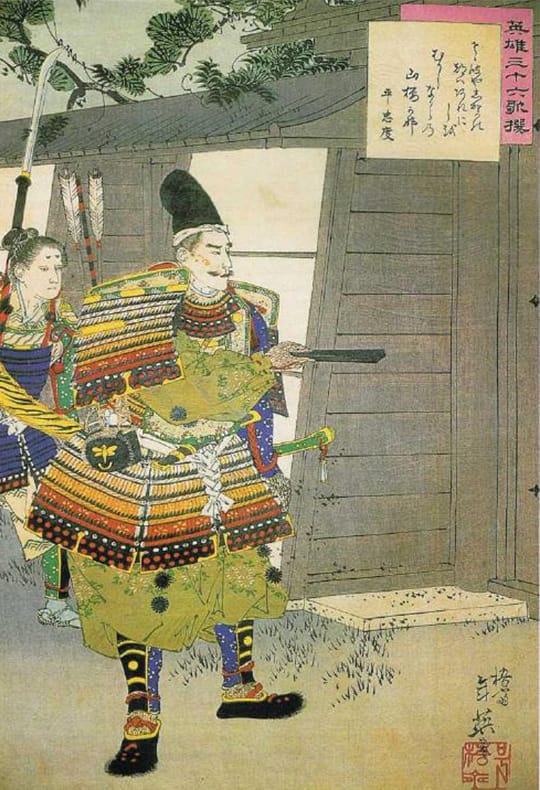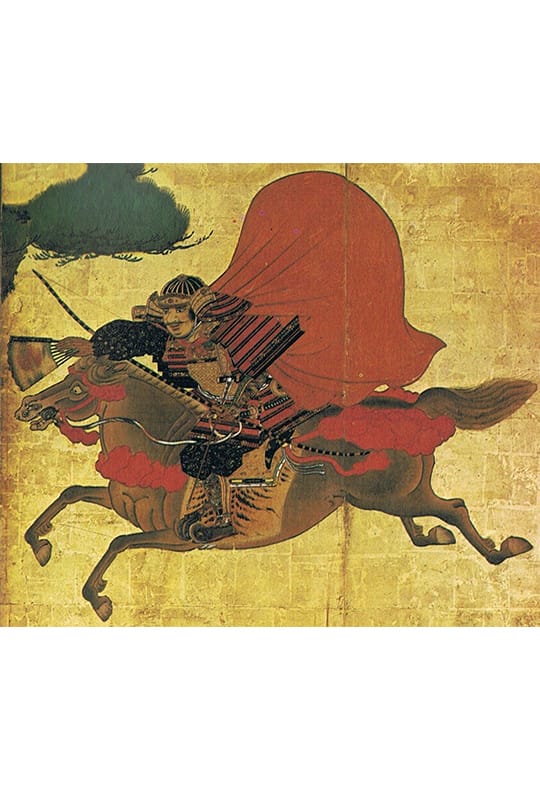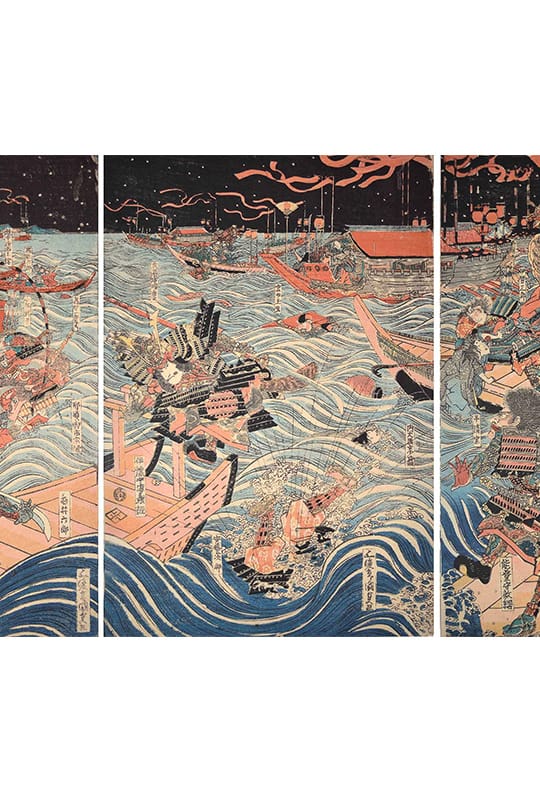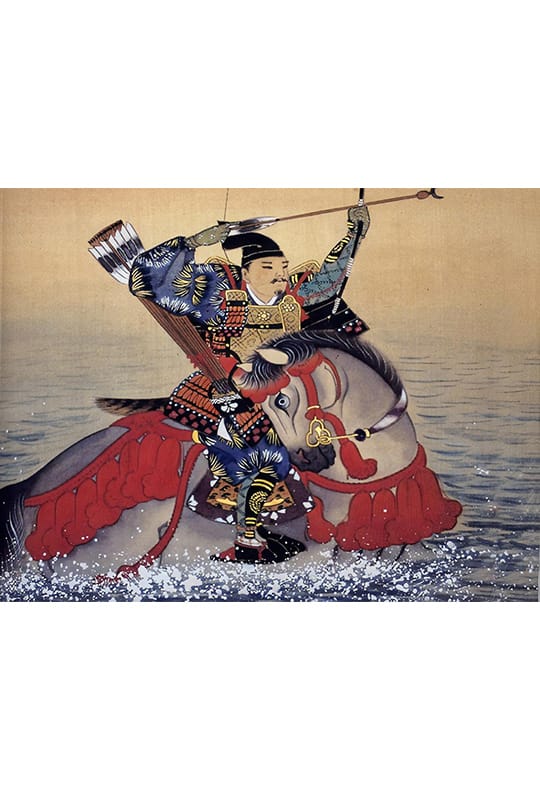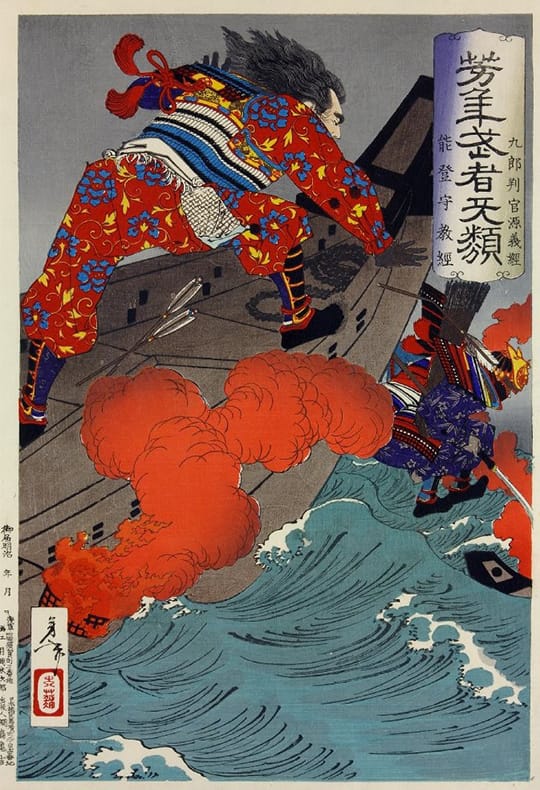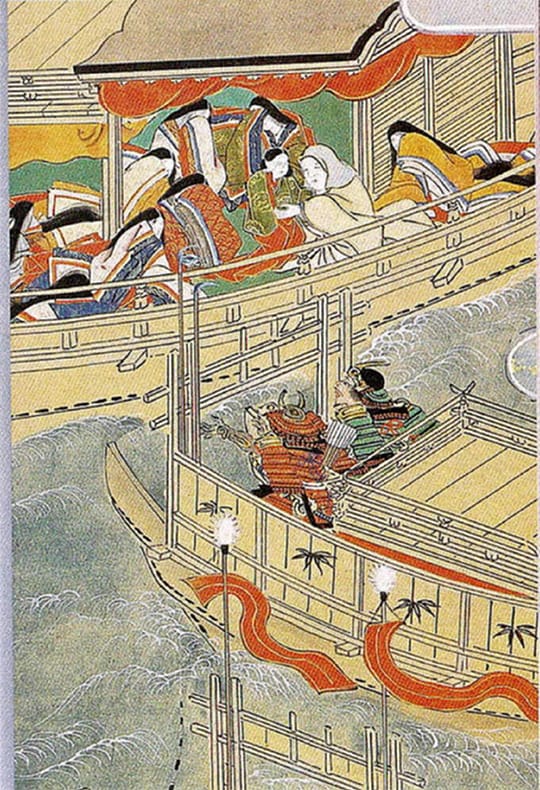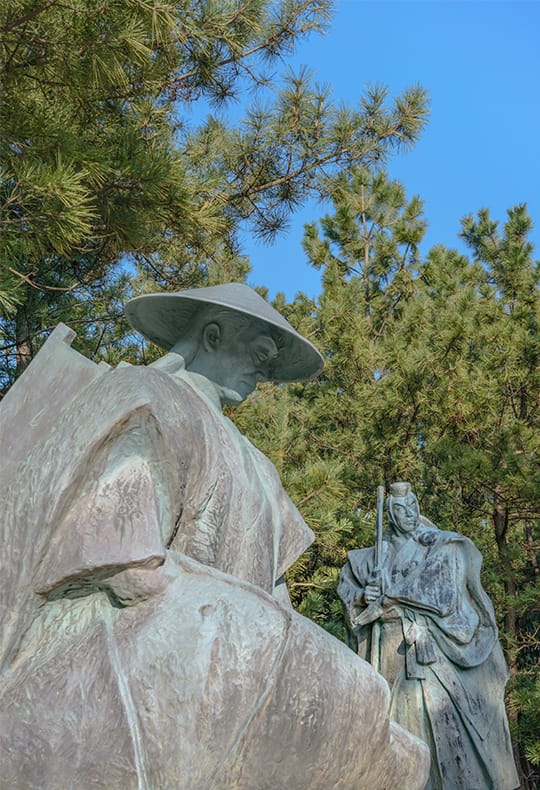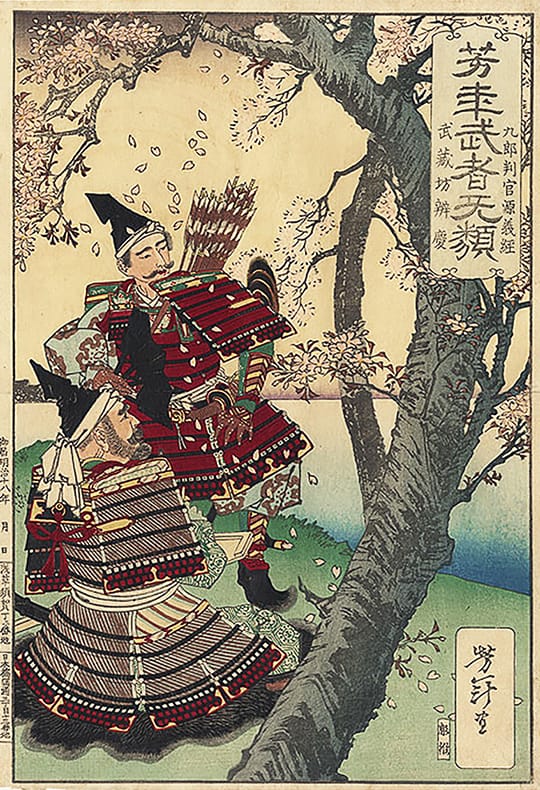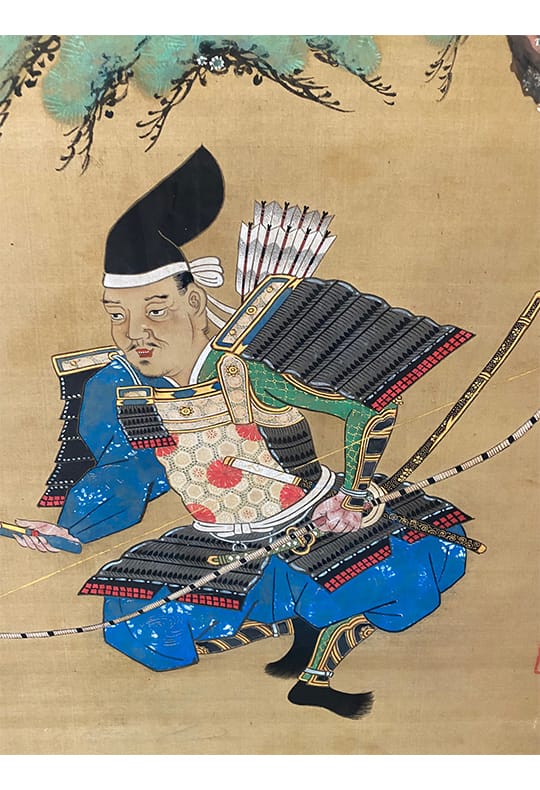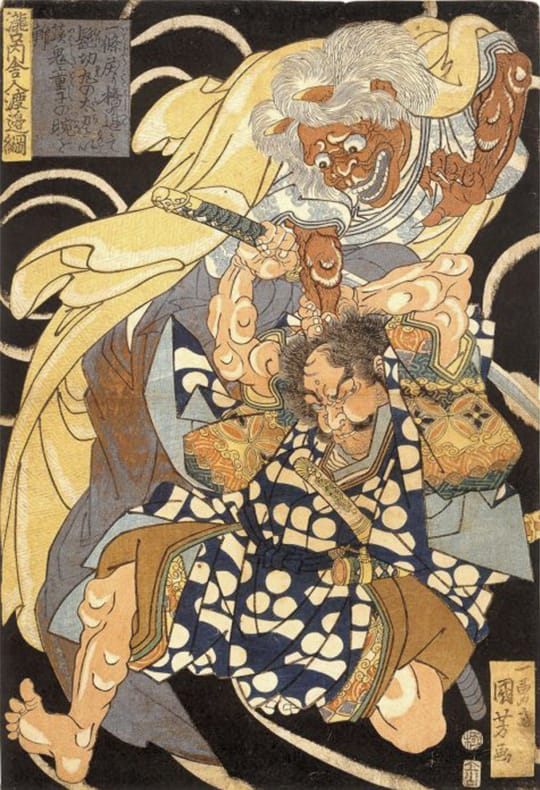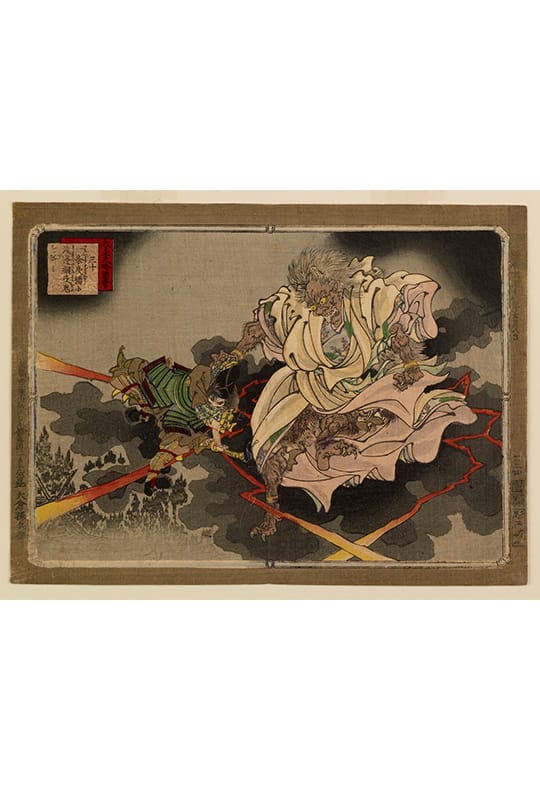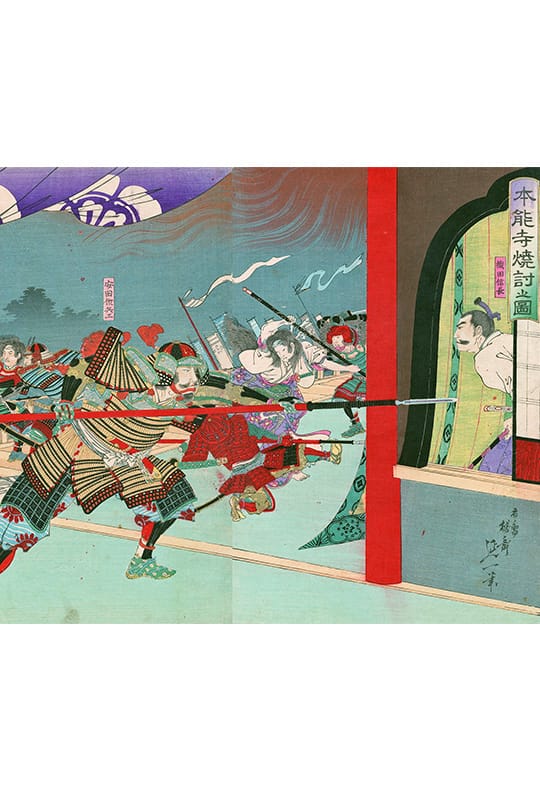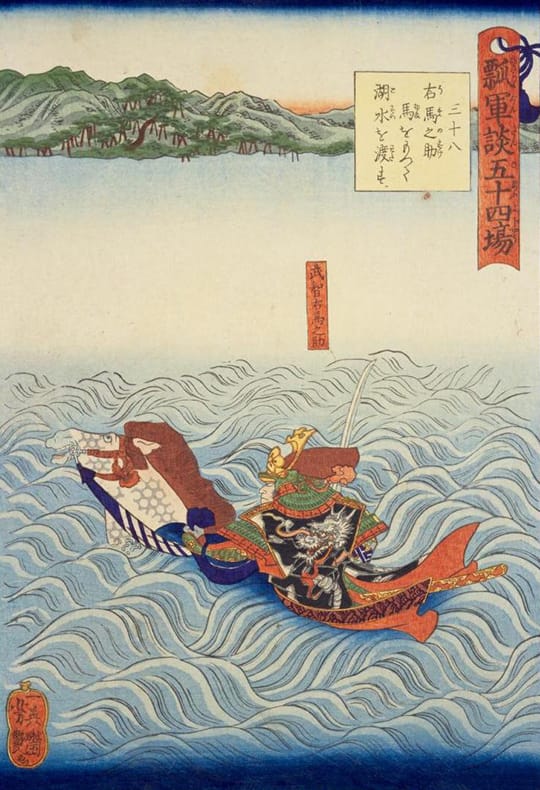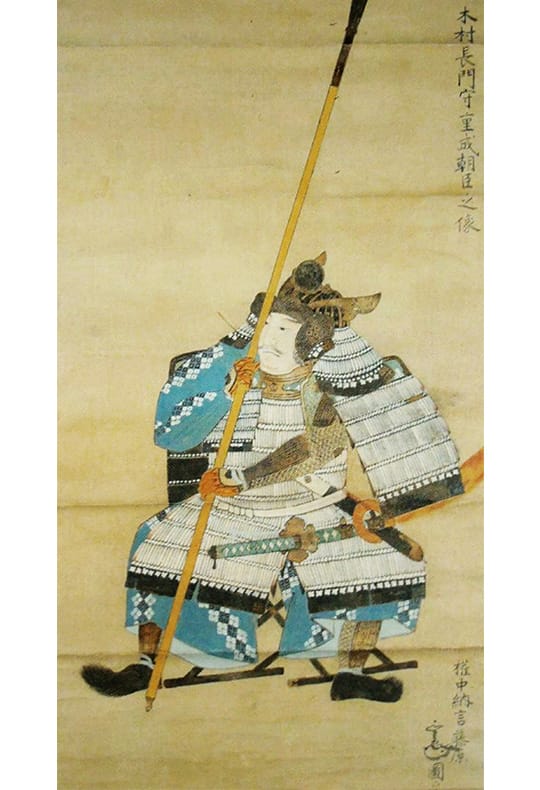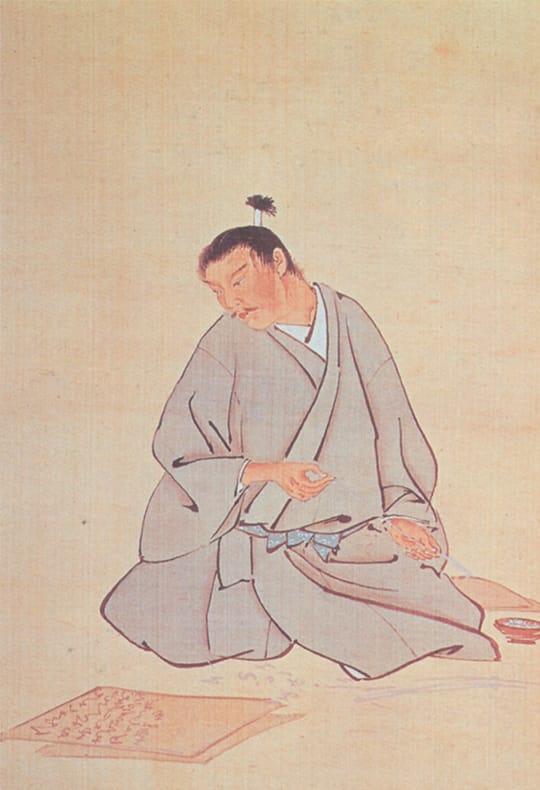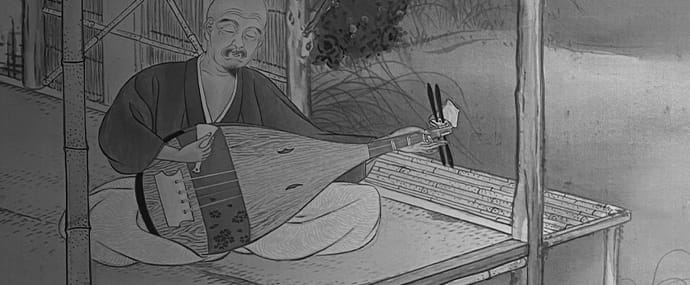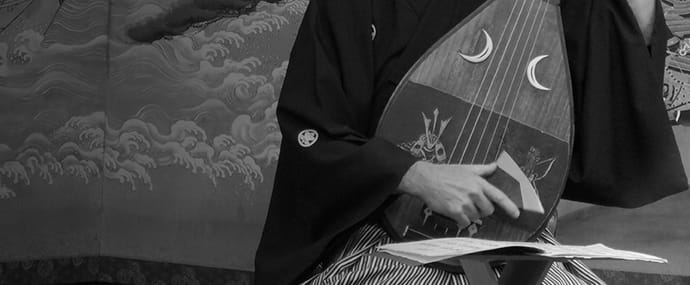Kyoto-search

funabenkei
舟弁慶
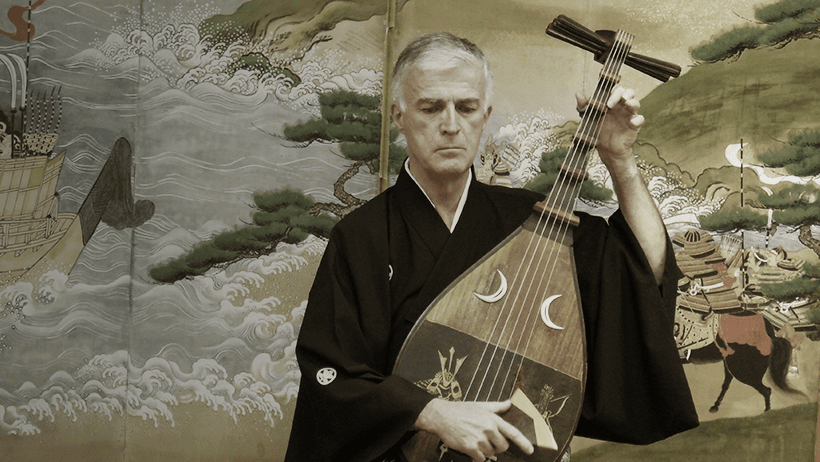
Introduction
Funabenkei, “Benkei on the Boat”, is a well-known story of the GENJI general Yoshitsune as he flees from pursuers sent by his half-brother Yoritomo, the first Kamakura shogun. In spite of Yoshitsune’s numerous victories for the GENJI cause, Yoritomo believed the slanderous rumors of Yoshitsune’s disloyalty, and sent men to capture him.
The central event in the Funabenkei episode is a sea storm that poses great danger to Yoshitsune and his retainer Benkei as they attempt to set sail from Amagasaki, located to the south of present-day Kobe. While this account is not included in the Tale of the Heike there is a brief mention of the sea-journey and the dangerous weather in the Azuma kagami (“Chronicle of Kamakura: 1180-1266“). This historically accurate source also claims that many of Yoshitsune’s retainers fled the boat during the storm, some of them drowning as they tried to escape. The Azuma kagami, however, mentions nothing of Shizuka’s leaving Yoshitsune at this point, and instead, places the occurrence of their separation to a much later moment in the story and shifts the location to Yoshino rather than Amagasaki.
The basic structure of the version presented in the Gikeiki, Chronicle of Yoshitsune (mid to late 14th c.), is fundamentally the same; however, rather than actual ghosts, Benkei merely compares the dark clouds hanging in the hills of Mt. Shoshazan (near Himeji) to specters of the HEIKE warriors killed in the battle of Dannoura in 1185. In the Noh play by the same title, the spirits of the HEIKE actually appear on the seas to attack Yoshitsune’s boat. Another change effected in the Noh play is the timing of Yoshitsune’s separation from Shizuka, which has been placed in the first part of the play before the sea-journey while the second part focuses on the appearance of the ghostly HEIKE warriors.
In 1885, KAWATAKE Mokuami adapted the Noh play for the Kabuki theatre and in doing so, greatly popularized this episode of Yoshitsune’s adventures as he flees his brother’s wrath.
Synopsis
The GENJI general, Yoshitsune, was pursued by his elder half-brother, Yoritomo, the chief of the GENJI-clan during the war between the GENJI and the HEIKE at the end of the 12th c. Yoritomo believed the slander of Yoshitsune’s disloyalty despite Yoshitsune’s success as a military leader on the battle-field. The rumor of his disobedience was completely untrue, but as Yoshitsune could not vindicate himself in front of his brother, he had to flee.
In this narrative, Yoshitsune is together with his beloved Shizuka – a professional dancer and entertainer – and of course with his inseparable retainer, Benkei. None of the other retainers are mentioned by name.
The biwa narrative begins with the journey by boat down the Yodo river from Kyoto to Osaka. Here, we are told, they passed present-day Yawata City and finally arrived in Amagasaki in Daimotsu’ura chō. As any further movement west into the Inland Sea required travel by boat, Benkei, as the most senior retainer, suggests to Yoshitsune that he temporarily separate from Shizuka. Any attempt at escaping their pursuers on the sea would be too dangerous for the group that included Shizuka. Yoshitsune agrees and asks his beloved to return to Kyoto. She is greatly saddened at the parting as are Yoshitsune and Benkei. The latter asks her to sing and dance as gesture of farewell.
Soon after the boat leaves the harbor, the weather deteriorates: black clouds form and a heavy storm ensues. When the storm is at its peak, the spirits of the HEIKE army, with Tomomori at their head, appear and attack the boat. Without any fear, Yoshitsune begins to strike back with his sword, but Benkei tells him that in a situation such as this, weapons are useless. Benkei moves to the front of the boat and begins to recite Buddhist prayers, the only means by which to escape the wrath of the sprits killed by Yoshitsune’s army at the Battle of Dannoura in 1185. With the exorcizing of the ghosts, Yoshitsune and Benkei safely continue their journey.

Lyrics
-
1. Where the floating clouds should drift Wohin die Wolken ziehen
ukitatsu kumo no yukue o ya 浮きたつ雲の行方をや
-
2. depends upon the wind and its whim. ist den Winden überlassen.
kaze no kokoro ni makasuran 風の心に任すらん
-
3. As we too are now adrift! Auch wir selber treiben ohne Halt
ima hata ware mo nagare no mi 今はた我も流れの身
-
4. Alas! How fleeting is this inconstant world! und leiden an der Unbeständigkeit der Welt.
sadamenaki yo no narai kana 定めなき世の習ひかな
-
5. It was the beginning of the Bunji era Es war noch zu Beginn der Bunji-Zeit,
toki shimo Bunji no hajimetsu kata 時しも文治の初めつ方
-
6. when Yoshitsune set out from Kyoto. als Yoshitsune aus der Hauptstadt Kyoto zog.
Hōgan miyako o ochikochi no 判官都を遠近の
-
7. To escape his pursuers, Um Häschern zu entfliehen,
michi semaku naranu sono saki ni 道狭くならぬ其先に
-
8. he headed in the direction of the Western Provinces. musste er in Westliche Provinzen ziehen.
saigoku no kata e to kokorozashi 西国の方へと志し
-
9. They rowed down the Yodo river, Und so ruderten sie abwärts auf dem Yodo-Fluss.
Yodo no nagare o kogikudaru 淀の流れを漕ぎ下る
-
10. as an autumn drizzle wets the fowl dozing amongst the reeds. Es war schon Herbst geworden, und der Regen fiel ins Schilf,
shigure no ashi no ukinedori 時雨の葦の浮寝鳥
-
11. Boatman, let them dream. wo Wasservögel aus dem Traum gerissen wurden von den Ruderschlägen.
yume na samashi so funabito yo 夢なさましそ舟人よ
-
12. Men are like the waters of Iwashimizu Ist der Mensch nicht gleich dem Quell von Iwashimizu,
yo no naka no hito wa nantomo Iwashimizu 世の中の人は何とも石清水
-
13. welling forth in clarity only to be sullied in the course of their passage sprudelt klar hervor und wird dann schmutzig.
sumi nigoru o ba shikasuga ni 澄み濁るをばしかすがに
-
14. Only the gods know what the future will bring. Nur die Götter wissen, was die Zukunft bringen wird.
kami zo shiruran yuku sue no 神ぞ知るらん行末の
-
15. “Watch over the fate of the warrior!” “Erbarmt uns unsres Krieger-Schicksals!“
bu’un o mamorase tamae ya to 武運を守らせ給へやと
-
16. they prayed in humility. beteten sie innig,
takaki mikage o fushi ogami 高き御影を伏し拝み
-
17. Driven by the wind, ließen sich vom Winde treiben.
kaze ni makasete yuku hodo ni 風に任せて行く程に
-
18. the sun had set. It was soon dusk Endlich gegen Abend,
yagate kureyuku iriai no やがて暮れ行く入相の
-
19. and the entire sky covered in rippling clouds, als der Himmel sich mit Wolken und mit Wellen einte,
sora wa hitotsu ni kumo no nami 空は一つに雲の波
-
20. indistinguishable from the distant haze of the waves. sah man in dem Dunst der Ferne Rauch aufsteigen.
kemuri no nami mo harubaru to 煙の波もはるばると
-
21. Here, at Amagasaki in Tsu, Das war Amagasaki im Lande Tsu,
kokozo Tsu no kuni Amagasaki こゝぞ津の国尼が崎
-
22. they arrived at the inlet of Daimotsu. wo die Gruppe bald die Bucht von Daimotsu erreichte.
Daimotsu no ura ni tsukinikeri 大物の浦に着きにけり
-
23. Benkei ventured forth and addressed Yoshitsune Benkei wagte nun, vor Yoshitsune hinzutreten,
Benkei gozen ni makari ide 弁慶御前にまかり出で
-
24. choosing his words with the greatest of care: sprach ihn ehrerbietig an:
kotoba o aratame mōsu yō 言葉を改め申すやう
-
25. “My Lord, forgive my impertinence, „Viel Ängste habt Ihr durchgestanden,
ikani waga kimi oosore ōki koto nagara いかに我君お恐れ多き事乍ら
-
26. Shizuka has been unmistakably accompanying you; stets war Shizuka in Treue Euch zur Seite.
Shizuka wa masashiku ontomo to miete sōrō ga 静は正しく御供と見えて候が
-
27. however, to now have a woman in your party Jetzt noch eine Frau mit Euch zu führen,
ima no orifushi nyoshō o meshigushi tamō koto 今の折節女性を召具し給ふこと
-
28. seems somehow inappropriate. halt‘ ich nicht für angemessen.
niawashikarazu sōraeba 似合はしからず候らへば
-
29. Painful though it may be, Schmerzvoll mag es sein,
yo nimo itawashiku sōraedomo 世にも痛はしく候へ共
-
30. let her return to the Capital.” doch schickt sie schnell zurück nach Kyoto.“
miyako e onkaeshi arekashi to 都へ御帰しあれかしと
-
31. he said with great reluctance. Seine Meinung derart klar zu äußern, fiel ihm schwer.
ito ho’i nage ni zo mōshi keru いと本意なげにぞ申しける
-
32. Yoshitsune heard his words and said, Als Yoshitsune dies hörte, sagte er:
Hōgan kore o kikoshi meshi 判官これをきこしめし
-
33. “Truly, there is something in what you say. „Ja, das ist wohl richtig.
genigeni soremo kotowari nari げにげにそれも道理なり
-
34. Shizuka! Recently, and without forewarning, Ich musste –
ikani Shizuka ware kono tabi omowazu mo 如何に静我れ此度思はずも
-
35. because of a worthless man’s slander, weil mich eine schlechte Kreatur verleumdet hatte –
iigai naki mono no zan ni yori 言甲斐なき者の讒により
-
36. I have had to flee the Capital as an outcast. unverzüglich aus der Hauptstadt fliehen.
ochiudo to narite kudaru tokoro ni 落人となりて下る所に
-
37. You have come this far with me, Du hast mich bis jetzt begleitet,
kore made mairishi kokorozashi これまで参りし志し
-
38. something that is truly praiseworthy. warst wahrhaftig tapfer.
kaesugaesu mo shinmyô nari かへすがへすも神妙なり
-
39. Nevertheless, to a place so distant across the waves Dennoch, übers Wasser ist es weit;
sarinagara senri no namiji harubaru to さり乍ら千里の波路遥々と
-
40. I cannot take you. du kannst nicht länger mit uns kommen,
nanji o tomonai yukan koto 汝を伴ひ行かんこと
-
41. I have come to think this is improper. davon sind wir alle überzeugt.
shikaru bekarazu omou nari 然るべからず思ふなり
-
42. For the time being, return to the Capital So kehre also jetzt zurück nach Kyoto,
hitomazu miyako e tachikaeri 一先づ都へ立帰り
-
43. and wait for a better time.” he told her. wart auf bessre Zeiten”, sprach er einfühlsam,
jisetsu o mate to zo notamaikeru 時節を待てとぞ宣ひける
-
44. And with Benkei, Yoshitsune comforted her. spendete ihr Trost, und Benkei fühlte mit:
Benkei tomo ni nagusamete 弁慶共に慰めて
-
45. “Your Lord and his reputation „Dein Herr sorgt sich um seinen Ruf
kimi wa tada yo no kikoe o ba 君は唯世の聞えをば
-
46. is a source of great concern for him. und macht sich viel Gedanken.
oboshimeshite no koto zo kashi 思召しての事ぞかし
-
47. Do not think his heart has changed! Glaub nicht, dass er sich von dir abwendet,
mikokorogawari to na oboshimeshi so 御心変りとな思召しそ
-
48. Your separation will be brief. Eure Trennung wird nicht lange dauern.
shibashi ga hodo no onwakare しばしが程の御別れ
-
49. To your eternal future!” and he pressed Auf die Zukunft! auf ein langes Leben!“ sprach er, reichte
yukusue chiyo to zo kiku no sake 行末千代とぞ菊の酒
-
50. Shizuka with Chrysanthemum wine. ihr den Chrysanthemen-Wein.
Shizuka ni koso wa susume kere 静にこそはすゝめけれ
-
51. “At any rate, I am insignificant, ”Was soll ich schlichtes Mädchen denn nur machen,
iya toni kakuni kazu naranu いや兎に角に数ならぬ
-
52. and even though I have no regrets. Bitterkeit darf nicht die Oberhand gewinnen.
mi ni wa urami no nakeredomo 身には恨のなけれども
-
53. Yet as the moment has come for the boat to leave, Doch der Augenblick, in See zu stechen, ist gekommen;
kore wa funaji no kadode naru ni これは船路の門出なるに
-
54. it seems the wind and the waves try to stop me.” selbst die Meereswinde halten mich zurück.”
namikaze mo Shizuka o todome tamō ka to 波風も静をとゞめ給ふかと
-
55. She wept without ceasing Sie ließ den Tränen freien Lauf.
namida o nagashi yūshide no 涙を流しゆうしでの
-
56. and vowed she would never change. „Nie wird sich meine Liebe zu Euch wandeln,“
kami kakete kawaraji to 神かけて変らじと
-
57. But promises are uncertain things. schwor sie ihm vergeblich.
chigirishi koto mo sadamena ya 契りし事も定めなや
-
58. “If we should truly part, „Wenn wir voneinander gehen,
ge ni ya wakare yori 実にや別れより
-
59. could there be anything more precious than your life? ist mein Leben nichts mehr wert.
masarite oshiki inochi kana まさりて惜き命かな
-
60. To think that I may never see you again!” Wie soll ich daran denken, Euch nie mehr zu sehen!”
kimi ni futatabi awan tozo omou 君に再び逢はんとぞ思ふ
-
61. “Indeed, Shizuka, „Nun denn, werte Shizuka,
ika ni Shizuka dono いかに静どの
-
62. in sympathizing with your emotions, in dein Herz zu schauen,
goshinchū sasshi mōshi 御心中察し申し
-
63. we too cannot restrain our tears. rührt auch uns zu Tränen.
warera mo rakurui tsukamatsutte sōrô 我等も落涙仕って候
-
64. Despite your sighs, Trotz des Schluchzens und des Grams,
onnageki wa saru koto naredo 御歎きはさる事なれど
-
65. would you recite a poem on the traveler’s departing ship, verehr uns doch zum Abschied
tabi no funaji no kadoide no waka 旅の船路の首途の和歌
-
66. just one!” Benkei requested. noch ein Tanzlied!“
tada hitosashi to susumureba たゞひとさしと勧むれば
-
67. Shizuka then rose, Shizuka versuchte sich zu fassen
sono toki Shizuka wa tachiagari 其時静は立上り
-
68. and all too quickly adjusted her pitch to the proper season: und sang ohne große Vorbereitung:
toki no chōshi mo toriaezu 時の調子もとりあへず
-
69. ‘When the wind subsides, the magnificent boat leaves the ferry. „Die Fähre sticht in See bei guten Winden.
tokō no yūsen kaze shizumatte izu 渡口ノ郵船風静マッテ出ヅ
-
70. and at the place of exile over the crests, the sun shines as you arrive.’ Klar sieht in der Ferne der Verleumdete sein Ziel.“
hatō no takusho wa hi harete miyu 波頭ノ謫所ハ日晴レテ看ユ
-
71. “And here is your hat. „Den Tanz-Hut, nimm ihn doch
kore ni eboshi no sōrō これに烏帽子の候
-
72. Please wear it.” und setz ihn auf.“
mesare sōrae 召され候らへ
-
73. “I have no desire to dance, “Zum Tanzen ist mir nicht zumute,
tachimau beku mo aranu mi no 立舞ふべくもあらぬ身の
-
74. the grief with which my sleeves flutter.” meine Ärmel schwenke ich betrübt!“
sode uchi furuu kanashisa yo 袖うち振ふ悲しさよ
-
75. ‘Ask more of the reeds of Shimejigahara, ‘Die Menschen sind dem Schilf im Moore gleich,
nao tanome shimejigahara no sashimogusa なほ頼め標茅が原のさしもぐさ
-
76. for as long as I am part of this world.’ doch wenn sie an mich (Kwannon) glauben, werden sie gerettet sein.’
ware yo no naka ni aran kagiri wa 我れ世の中にあらん限りは
-
77. In a sacred poem such as this, there can be no falsehood.” Diese Hymne ist ganz sicher wahr.“
kaku son’ei no itsuwari nakuba かく尊詠の偽りなくば
-
78. And soon the boat was ready to depart. Das Schiff war nun bereit zur Abfahrt.
yagate miyo ni idebune no やがて御世に出船の
-
79. “Sailormen, hurry and weigh anchor!” “Löst die Taue ihr Matrosen, schnell!”
funakodomo haya tomozuna o tokutoku to 船子共はや纜をとくとくと
-
80. Yoshitsune urged, befahl Yoshitsune,
susume mōseba Hōgan mo 勧め申せば判官も
-
81. and he left his lodging. und trat aus seiner Unterkunft heraus.
tabi no yadori o idetamō 旅の宿りを出で給ふ
-
82. Shizuka watched them leave, Gar traurig schaute Shizuka ihm nach.
Shizuka wa ato o miokuritsu 静は後を見送りつ
-
83. discarded her hat and robe, Sie warf den Hut und Überwurf von sich,
eboshi hitatare nugisutete 烏帽子直垂脱ぎすてゝ
-
84. and choked with tears at this parting. nahm Abschied fast erstickend an den Tränen.
namida ni musebu onwakare 涙に咽ぶおん別れ
-
85. What a piteous sight it was! Wer dies sah, war tief erfüllt von Mitleid.
mirume mo itodo aware nari 見る目もいとゞ哀れなり
-
86. ”Hurry and launch the boat!” ”Schnell jetzt, lasst uns ziehen!”
isogi mifune o idasubeshi to 急ぎ御船を出すべしと
-
87. the boatmen cried. riefen die Matrosen laut,
tachisawagitsutsu funakodomo 立ち騒ぎつゝ船子共
-
88. and with the evening tide, “Ho! Heave ho!” und ‘holla ho’ mit Wellenschlag
eiya eiya to iu shio ni えいやえいやとゆう汐に
-
89. the boat was launched. lief schnell das Schiff aufs offne Meer hinaus.
tsurete fune o zo idashikeru つれて船をぞ出だしける
-
90. How unsettling, the wind had changed! Wie war es möglich, plötzlich drehten sich die Winde.
Ara shōshi ya kaze ga kawatte sōrō あら笑止や風が変って候
-
91. Ominous black clouds suddenly spread across the sky, Eine grässlich schwarze Wolke deckte jetzt den Himmel zu.
ibukashi ya kurokumo niwaka ni minagiri watari 訝しや黒雲俄に漲り渡り
-
92. from Mount Mukoyama in the distance, Vom Berg Mukoyama,
ano Mukoyama あの武庫山
-
93. the wind howled down the Yuzuriha peak, vom Gipfel Yuzuriha fegten Stürme,
Yuzurihagadake yori fukiorosu arashi ni 弓弦羽が嶽より吹き颪す嵐に
-
94. blowing the white waves across the ship’s prow, Wellen wurden aufgepeitscht und trieben übern Bug.
shiranami aorite hesaki o koe 白波煽りて舳を越え
-
95. on the right side, on the left side; Weder auf die linke noch die rechte Seite,
mete no kata ni mo yunde ni mo 右手の方にも左手にも
-
96. too late to now push it back to shore! nirgends gibt es ein Zurück.
oshi mo kaeranu fukakusa yo おしもかへらぬ不覚さよ
-
97. “It’s a furious storm. One cannot be careless! Haa, solche Böen hatte man ja nicht erwartet,
suwaya hayate zo yudansu na すはや颶ぞ油断すな
-
98. The mooring ropes are lowered, the mats are rolled Seile werden eingezogen, Matten eingerollt.
tsuna hikiorose toma make to 綱引下せ苫巻けと
-
99. and the oarsmen do all they can. Matrosen wirbeln atemlos umher –
kajikodomo hisshi ni furumaedo 楫子共必死に振舞へど
-
100. The breakers are without end, denn ungeheuer sind die Brecher.
nami wa gōsha no gotoku ni te 波は恒沙の如くにて
-
101. and it does not appear that they will reach the shore. Ob man da noch Land erreicht?
kugaji ni tsuku beki yō zo naki 陸地に着くべき様ぞなき
-
102. Yet how strange! When they looked at the sea, Doch seltsam, auf dem Wasser, kaum zu glauben,
satemo fushigi ya kaishō o mireba 偖も不思議や海上を見れば
-
103. the HEIKE warriors who had died in the Western Provinces, HEIKE-Krieger, die im Westen ihren Tod gefunden hatten,
saigoku nite horobishi HEIKE no ichimon 西国にて亡びし平家の一門
-
104. were rising here and there like mist tauchen hier und dort wie Wolken auf,
unka no gotoku ochikochi ni 雲霞の如く遠近に
-
105. on the surface of the waves. sie gleiten auf den Wellen hin.
nami ni ukabite idetaru zo ya 波に浮びて出でたるぞや
-
106. ”Hear me for I am the 9th generation descendant ”Hör zu, ich stamme ab im neunten Glied von Kaiser Kanmu,
somosomo kore wa Kanmu Tennō kudai no kōin 抑も之は桓武天皇九代の後胤
-
107. of Emperor Kanmu, the ghost of TAIRA no Tomomori. bin der Rachegeist von TAIRA no Tomomori.
TAIRA no Tomomori ga yūrei nari 平の知盛が幽霊なり
-
108. Ah, could it be? But it is Yoshitsune!” Bist es wirklich Du, Yoshitsune!”
ara mezurashi ya ikani Yoshitsune あら珍らしや如何に義経
-
109. In an unexpected breaker, Da droht auf einmal eine Küstenwelle,
omoi mo yoranu uranami no 思ひも寄らぬ浦波の
-
110. it appeared that Tomomori, sinking with it, um – wie Tomomori, der darin versinkt –
Tomomori ga shizumishi arisama ni 知盛が沈みし有様に
-
111. would drag Yoshitsune, too, auch Yoshitsune zu versenken
mata Yoshitsune o mo uchishizume また義経をも打沈め
-
112. into the bottomless depths of Netherworld und ihn auf den Höllen-Grund zu ziehen.
naraku no soko e hittaten to 奈落の底へ引っ立てんと
-
113. He brandished his halberd aloft, Seine Hellebard’ geschwungen
ōnaginata o furikazashi 大長刀を振りかざし
-
114. and when an evil wind blew kicking up the tide, teilt ein Teufelswind die Wellenfluten.
ushio o ketatete akufū o fukkakureba 潮を蹴立てゝ悪風を吹きかくれば
-
115. their eyes spun, their minds were confused; Dunkel wird es vor den Augen, Herz und Geist verwirren sich,
manako mo kurami kokoro mo midare 眼もくらみ心も乱れ
-
116. and they were at a loss! und niemand weiß, was jetzt geschieht.
zengo o bōzuru bakari nari 前後を忘ずるばかりなり
-
117. At that moment, Yoshitsune, without the slightest alarm, Yoshitsune zeigt sich furchtlos
sono toki Yoshitsune sukoshimo sawagazu 其時義経少しも騒がず
-
118. “Even if an evil spirit seeks revenge, ”Auch wenn Rachegeister zornig sind,
tatoi akuryō urami o nasutomo たとひ悪霊恨みをなすとも
-
119. what could it possibly do?” so kümmert mich das nicht!”
somo nanigoto no arubeki zo to そも何事のあるべきぞと
-
120. When he withdrew his sword to exchange blows, Er zieht sein Schwert und kämpft,
tachi nukihanachi tatakaeba 太刀抜き放ち戦へば
-
121. Benkei leapt forth and pushed him aside. doch Benkei hält ihn ab.
Benkei ana ya to oshihedate 弁慶あなやと押距て
-
122. “A weapon can do nothing.” ”Waffen helfen hier nichts mehr”;
uchimono waza nite kanōmaji to 打物業にて叶ふまじと
-
123. Standing in the bulwarks, er wendet sich im Schiff nach vorn,
funabata ni tsuttachiagari 舷に突っ立ち上り
-
124. he rubbed his prayer beads, and as they rasped, reibt ”sarasara” seinen Rosenkranz
juzu sarasara to oshimonde 珠数さらさらと押揉んで
-
125. he called upon the holy names of the Five Great Kings of Heaven. und ruft die Namen der Fünf Himmelsfürsten an,
Godaimyōō no onna ni kake 五大明王の御名にかけ
-
126. The power of his heartfelt prayer beschwört sie voller Inbrunst.
isshin kottaru kinen no shinriki 一心こったる祈念の信力
-
127. weakened the evil spirits, Böse Geister können dem nicht widerstehen,
sashimono akuryō tekishikane さしもの悪霊敵しかね
-
128. and gradually they faded into the distance. und entfernen sich allmählich.
shidai shidai ni tōzakaru 次第次第に遠ざかる
-
129. Benkei shouted: “Now! Work together! Benkei ruft zu allen seinen Männern: ”Los jetzt!”
Benkei koko zo to chikara o awase 弁慶こゝぞと力を合せ
-
130. Push! Row on!” treibt sie an, mit voller Kraft zu rudern.
oseya monodomo koginokeyo to 押せや者共漕ぎのけよと
-
131. Yet when they drew near the shore, Als sie aber schon der Küste nahe sind,
nagisa no kata e yosen to sureba 渚の方へ寄せんとすれば
-
132. again the evil spirits appeared, da taucht die Geisterschar von neuem auf
nao onryō wa tachiaraware 猶怨霊は立ち現はれ
-
133. and drew close as if never to let them go, und will die Flucht verhindern.
nogasajimono to yorikuru o 遁さじものと寄り来るを
-
134. but a prayer to put them to flight. Nur Gebete helfen, dass die Gruppe noch entkommen kann.
opparai inorinoke 追っ払ひいのりのけ
-
135. And drifting aimlessly in the waning tide Auf Wellen der Gezeiten fahren, gleiten sie dahin,
mata hiku shio ni yurare yurare 又引く汐にゆられゆられ
-
136. they vanished into the white foam. bis ihre Spur sich in der weißen Gischt verliert,
ato shiranami tozo narinikeru あと白波とぞなりにける
-
137. they vanished into the white foam. bis ihre Spur sich in der weißen Gischt verliert.
ato shiranami tozo narinikeru あと白波とぞなりにける
Notes
1./2… The first two lines are from the Noh piece Tsuchigumo (Earth Spider). 5. Bunji era…1185-1190. According to historical records, Yoshitsune left the Capital in the eleventh month of 1185. This text, however, follows the Noh play Funabenkei, placing his departure “at the beginning of the Bunji era”, or 1185. 8. Western provinces… This usually indicates the region west Kyoto 9. Yodo river… This river connects Kyōto with Osaka Bay. 12. Iwashimizu… Iwashimizu refers to the Hachiman shrine in Yawata City (Iwashimizu Hachimangū). The text plays with the meaning Iwashimizu, “clear waters”, which refers to the Buddhist concept of the innate purity of birth being sullied as one lives. 21. Amagasaki in the land of Tsu… This refers to the present day City of Amagasaki located to the west of Osaka. Tsu (Settsu) is one part of Osaka and Hyōgō prefecture. 22. Daimotsu… The present day name of the place has changed to Amagasakishi Daimotsuchō. 26. Shizuka… She was Yoshitsune’s mistress. In spite of Yoshitsune having been married, his wife is rarely mentioned. Instead, his primary female companion was Shizuka, a woman of humble birth, and a shirabyōshi. These professional entertainers were dancers and singers who also engaged in prostitution. In The Tale of the Heike Shizuka is the most popular female figure associated with the GENJI clan. 50. Chrysanthemum-wine… A chrysanthemum flower was placed in a sake-cup to symbolize longevity. 69./70. … These two lines are sung as a shigin, a Chinese poem sung to a fixed melody. The poem is included in the anthology, Wakanrōeishū of 1018, and said to be written by ONO no Takamura (802-853) when sent into temporary exile. 71. the dancer’s hat…The hat is an eboshi, normally worn by adult men, which Shizuka is wearing with a hitatare (see line 80.), another article of male attire. This was the expected attire of the shirabyōshi. 75./76. … This poem is from the Shinkokinshū Anthology (first quarter of the 13th c.) and said to be a divine song composed by the Kannon of the Kyomizu temple in Kyōto. Shimejigahara is the name of a field in Tochigi prefecture, and also an uta makura, a word commonly used in poetry that functions as a rhetoric formula for a geographic place. Sashimogusa is another term for yomogi, “mugwort”. 83. Hat and robe… This is the hitatare mentioned in line 71. 92. Mukoyama… This is an ancient term for Mount Rokkō near Kōbe. 93. Yuzuriha Peak… In Japanese: “Yuzurihagadake” is one of the hills between Kōbe and Himeji. 106. Emperor Kanmu…The HEIKE claimed Emperor Kanmu (737-806) as their ancestor. 107. TAIRA no Tomomori… He was the third son of Kiyomori, the leader of the HEIKE-clan. He died in the battle of Dannoura (1185) by drowning himself. 125. The Great Five Kings of Heaven… In the Noh play Funabenkei, The Five Kings of Esoteric Buddhism are Fudō, Gōsanze, Gundari, Dai’itoku, and Kongōyasha. Benkei was a warrior monk from the Temple of Mount Hiei, the center of the Tendai Sect, and renowned for its studies in Esoteric Buddhism.

Music Notes
Funabenkei is commonly performed in chikuzen biwa concerts. Despite its length, it can be easily reduced to 15 minutes, with the most delicate and refined section — the parting of Shizuka — being omitted. This scene in which Yoshitsune, Benkei, and Shizuka hold an animated conversation is notably demanding as the performers must quickly change their voice according to the role. The most beautiful scene of this section is Shizuka’s farewell dance after line 68. The dance is represented by the biwa interlude Hō’ō (Phoenix), which poetically links the scene following Heian-period practice when this mythical bird was often used as a symbol. The structure of this interlude — originally composed for the 4-stringed biwa — emanates a beautiful archaic atmosphere. The plectrum primarily executes downstrokes, the upstrokes associated with the modern era notably absent. When Phoenix is played slowly, an elegant world reminiscent of gagaku, the music of the imperial court, enthralls the listener.
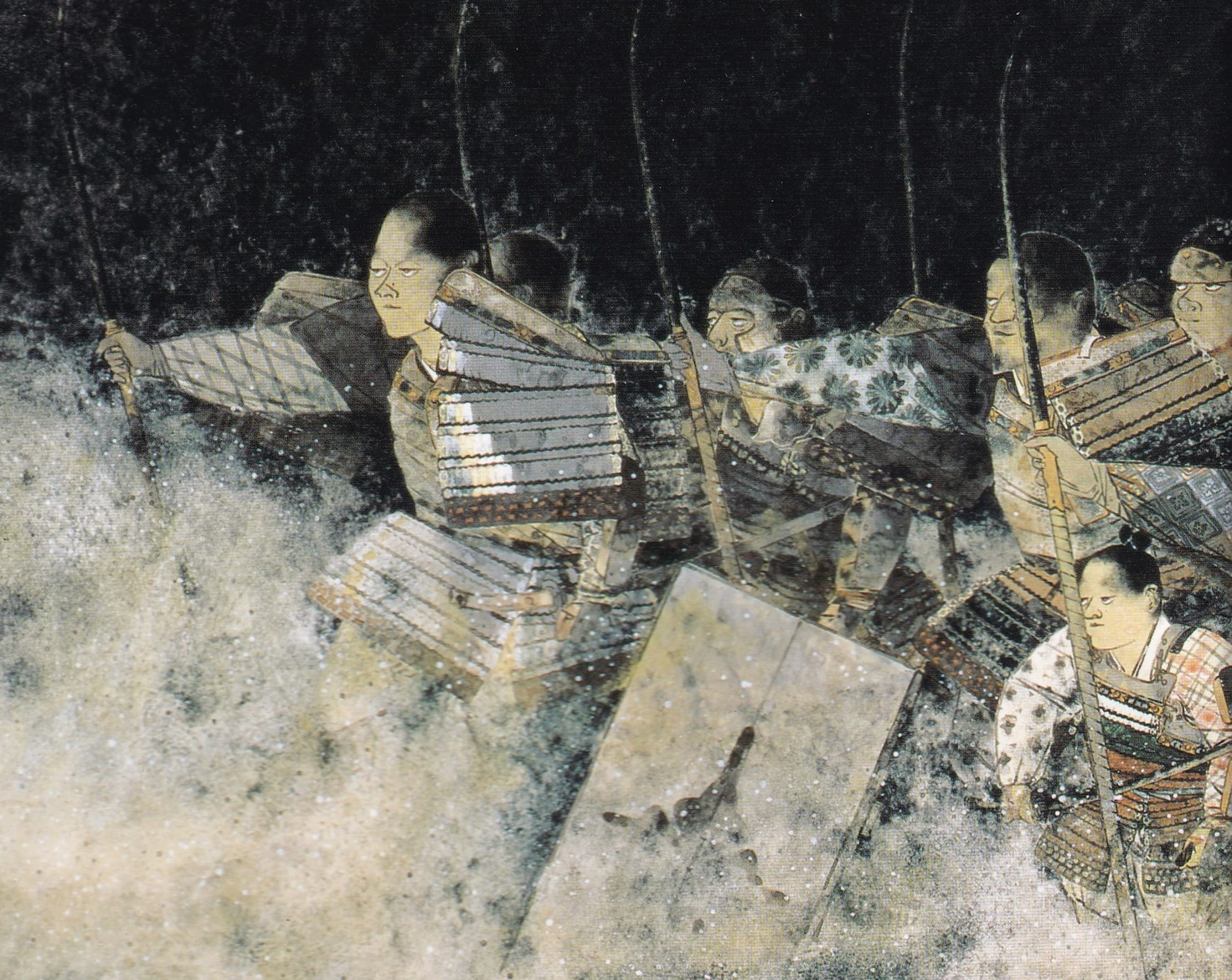
Even when the ballad is truncated, the finale scene of the ghosts attacking Yoshitsune’s ship during a storm on the Inland Sea is never omitted, and is one of the most colorful ghost scenes of the chikuzen biwa repertoire. It is common with famous scenes, that different musical renditions have been transmitted. There are two versions of line 106, for example, when the ghost of Tomomori rises from the waves and introduces himself with,
“Hear me, for I am the ninth generation descendant of Emperor Kanmu.”
The score indicates the pitch “7”; however, only women performers perform this high pitch. Men, with their darker voices, begin at a lower pitch, and gradually rise until the end of the line, which causes the audience to truly shiver.
